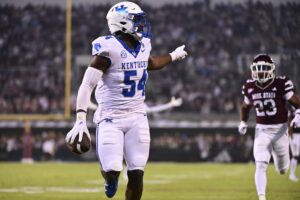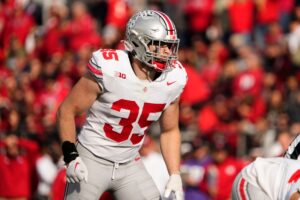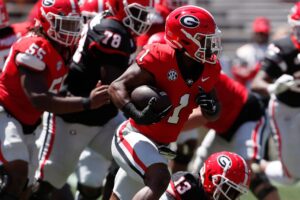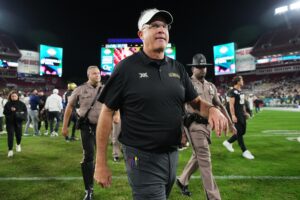The Kansas Jayhawks arguably lead the nation in glaring holes in their roster. In that same vein, Kansas quarterbacks of recent vintage may be the most maligned position group in the country.
Through three seasons under coach David Beaty, Kansas hasn’t had steady, competent quarterback play for any sustainable stretch. The program’s continually disjointed offense often ties back to the lack of consistency under center. A tough spring didn’t help matters, either.
This will be a unique and pressure-filled year for Beaty since he is likely a lame duck after Kansas athletics director Sheahon Zenger was fired in May. With his boss’ ouster and his 3-33 record in three seasons, Beaty will need to rely on one (or all) of the three following quarterbacks to establish some sort of positive momentum in 2018.
Each player’s 2017 stats are included with their breakdown.
Peyton Bender
| Comp% | Yards | Y/A | TDs | INTs | Rating |
| 54.2 | 1,609 | 5.9 | 10 | 10 | 108.5 |
Bender opened 2017 as Kansas’ starter but underwhelmed the program in his first season in Lawrence. A transfer from Washington State, Bender started KU’s only win of the year (Week 1 versus Southeast Missouri State) but threw just six touchdowns and eight interceptions over his other nine games played.
His biggest attributes include a strong arm and familiarity with the air raid offensive system (which he experienced at Washington State before transferring to Kansas). On the downside, his accuracy was questionable at best, often overshooting targets with his aforementioned arm strength.
Additionally, he has little to no mobility in the pocket. That’s a major liability behind a notoriously porous Jayhawks offensive line.
The coaching staff clearly has some confidence in Bender, considering he played more than any other Kansas passer last season. That said, his faults were blatant and went uncorrected all season long in 2017. That fact alone would make it hard for KU fans to imagine a great deal of growth this coming year. Along with the passing struggles, his pocket presence harkens back to the Jake Heaps era in 2013, and not in a positive way.
Strong arm, questionable accuracy, immobile. Bender wouldn’t be a surprising choice to be KU’s opening-day starter (Athlon Sports even projects that already). However, it would hardly be an inspiring choice by Beaty and co.
Carter Stanley
| Comp% | Yards | Y/A | TDs | INTs | Rating |
| 54.6 | 1,108 | 6.0 | 4 | 7 | 104.5 |
Stanley’s biggest asset, at least in terms of what differs from Bender, is his mobility. Until he eventually got full-time quarterback action for part of last season, Stanley was even used just on obvious quarterback draw plays. His pure rushing numbers are unimpressive: 91 yards on 55 carries. However, that includes sacks, which were common behind the aforementioned weak KU blocking.
His ability as a passer is where more questions pop up.
In his first start of 2017, Stanley had his best passing performance ever, throwing for 418 yards, one touchdown and one interception on Oct. 28 against Kansas State. That’s the fifth-highest total in Kansas history. Outside of that game, he passed for just 690 yards with three touchdowns, six picks and a 97.7 rating.
There’s also something to be said for Stanley’s intangible leadership. He started Kansas’ two closest conference defeats last year. He also started the Jayhawks’ only Big 12 win of the Beaty era, in 2016 versus Texas.
Stanley’s game has likable assets. He’s mobile, poised and has exhibited toughness when given the chance. You can’t ignore his shortcomings throwing the ball for a pass-first team like KU, though. Potential improvement has to be considered, but the sample he’s given Kansas’ coaches so far makes it understandable why he wouldn’t be given the job automatically.
Miles Kendrick (transfer from College of San Mateo)
| Comp% | Yards | Y/A | TDs | INTs | Rating |
| 57.9 | 1,889 | 10.6 | 18 | 9 | 170.3 |
Kendrick is the wild card of the group. He’s a dual-threat quarterback, giving KU another option for a more mobile passer. He ran for nearly 38 yards per game at College of San Mateo last season, averaging about four yards per carry with five touchdowns.
His passing stats, clearly, are also on another level from the returning quarterbacks in Lawrence. His numbers in conference play last year were even stronger, posting a 198.4 rating in CCCAA competition.
Of course, you also have to consider that Kendrick was playing junior college ball, not in the Big 12. Even for a league frequently ridiculed for its defenses, Division I competition is an incomparable beast compared to the California Community College Athletic Association.
Still, fans are already willing to turn the reigns over to Kendrick.
I want it on record that officially as of June 4th, 2018 I am team Miles Kendrick for KU football starting Quarterback this season.
— RRinehart (@RRinehart2012) June 4, 2018
Y’all forgot Miles Kendrick (Kansas) https://t.co/a8POkLvDuo
— Bryson Stricker (@BryBryStrick) June 4, 2018
Also, I watched KU football practice from afar a couple days ago.
Miles Kendrick. Learn the name. Wait on it. #TrustTheProcess #kufball
— Talkin’ Hawks (@TalkinHawks) April 11, 2018
Desiring that Kendrick starts is warranted, at least to a degree. His running and passing stats pop out. His mobility somewhat mitigates the detriment that is the offensive line. A quarterback who actually moves the ball would be a welcomed change.
Change itself may be the biggest catalyst behind putting Kendrick in charge on the field. There’s been consistency for the KU offense in recent years in the sense that it’s been consistently disjointed, inefficient and ineffective. It’s only natural to want something that could quell that.
Beaty, however, hasn’t exactly been prone to making big changes during his tenure. Whether it’s game plans or sticking with “his guy” at quarterback too long, that’s been a common tendency since 2015. Kendrick is the new, exciting choice, but don’t be surprised if Beaty leans with familiarity over a potential splash when he ends up choosing his day-one starter.
Main Photo Credit:







